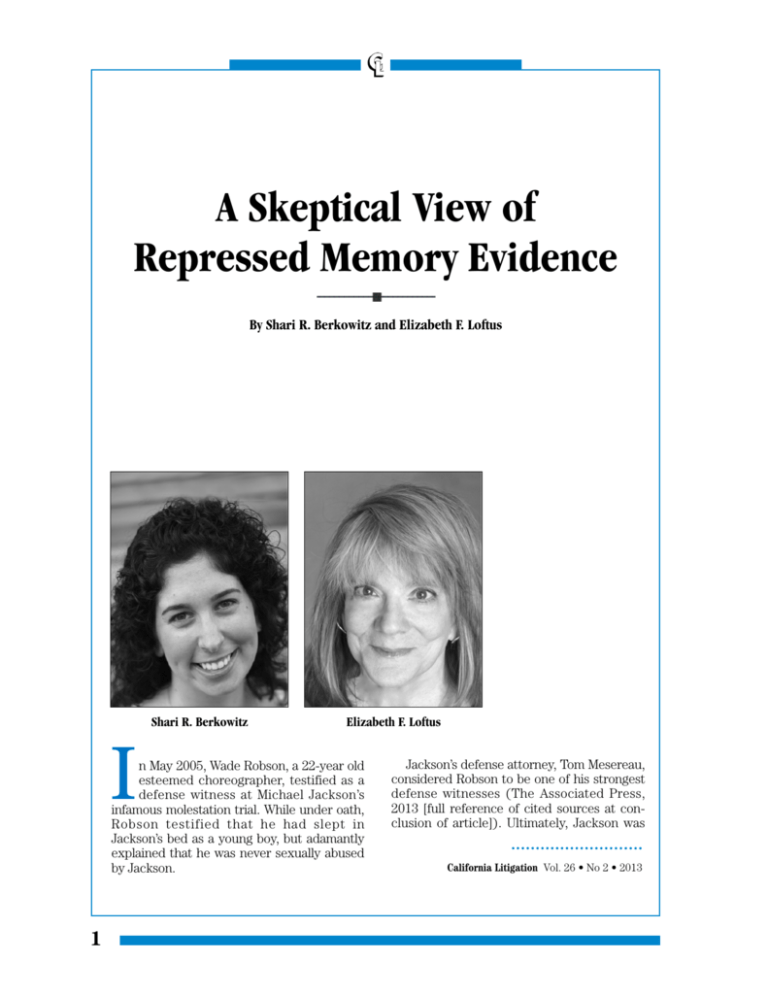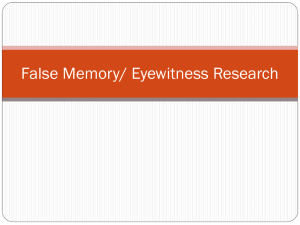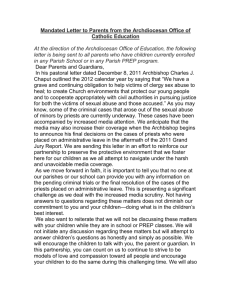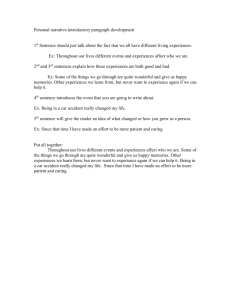
A Skeptical View of
Repressed Memory Evidence
By Shari R. Berkowitz and Elizabeth F. Loftus
I
Shari R. Berkowitz
Elizabeth F. Loftus
n May 2005, Wade Robson, a 22-year old
esteemed choreographer, testified as a
defense witness at Michael Jackson’s
infamous molestation trial. While under oath,
Robson testified that he had slept in
Jackson’s bed as a young boy, but adamantly
explained that he was never sexually abused
by Jackson.
1
Jackson’s defense attorney, Tom Mesereau,
considered Robson to be one of his strongest
defense witnesses (The Associated Press,
2013 [full reference of cited sources at conclusion of article]). Ultimately, Jackson was
California Litigation Vol. 26 • No 2 • 2013
acquitted of all charges. In 2009, Jackson
passed away, and two months after his
death, Robson was quoted as describing
Jackson as a “kind human being” (CNN,
2013).
Yet, on May 1, 2013, Robson sought permission from the Los Angeles probate court
to file a claim against Michael Jackson’s
‘
…decades of scientific
research have shown that
people can develop false
(New York Daily News, 2013).
Although the facts of Robson’s claim will
surely attract a great deal of media attention,
this will not be the first time that a California
court has been asked to consider a repressed
memory claim. In one of the most famous
cases, more than two decades ago in 1990,
Eileen Franklin-Lipsker testified in the San
Mateo County Courthouse that she had witnessed her father, George Franklin, murder
her best friend, Susan Nason in 1969. Eileen
explained that she had repressed her childhood memories of Susan’s murder for 20
years. With nothing more than Eileen’s recovered (de-repressed) memories, Franklin was
found guilty of murder.
Around this same time, in another famous
case, Holly Ramona, accused her father, Gary
Ramona, of years of brutal child sexual abuse.
Like Eileen, Holly, claimed that she had
repressed her traumatic childhood memories.
memories of events that have
— A Dearth of —
Credible Scientific Evidence
never actually happened to
Over the last three decades, California
courts (as well as courts in other states and
throughout the world) have been forced to
consider claims of repressed memories. Yet
despite the popularity of these claims, it
might surprise readers to learn that there is
virtually no credible scientific support for the
notion of repression. In other words, there is
no evidence to suggest that highly traumatic
childhood memories can be unwittingly banished from the conscious mind and stored in
the unconscious mind in pristine condition
for many years, only to be recalled later.
Harvard Psychology Professor, Richard
McNally, made this same point succinctly
when he wrote: “The notion that the mind
protects itself by repressing or dissociating
memories of trauma, rendering them inaccessible to awareness, is a piece of psychiatric
folklore devoid of convincing empirical support” (McNally, 2003, p. 275).
Yet the debate over the existence of repressed memories remains one of the most
controversial topics in the field of psychology
’
them before…
estate. Robson now claims that Jackson sexually abused him over a seven-year period,
starting when he was seven years old.
Why would Robson, who previously testified under oath that he had never been
molested, suddenly claim years of abuse at
the hands of Jackson? Robson’s lawyer,
Henry Gradstein, explained that Robson had
recently suffered an emotional breakdown
(The Associated Press). Media sources
reported that Robson subsequently received
weeks of psychotherapy (TMZ, 2013), and
according to Gradstein, Robson recovered
his repressed memories of child sexual abuse
2
(Lindsay & Read, 2001). Commonly referred
to as the “memory wars,” psychologists have
long debated the nature of traumatic memory. Even today, it is not unusual for scientific
conferences and scientific journal articles to
focus on the recovered memory debate, as
the phenomenon of repressed memory is still
highly controversial. For instance, in 2010,
respected University of Nebraska-Lincoln
Professor Robert Belli organized a symposium on the recovered memory debate. As
Belli (2012) stated in his subsequent article,
‘
Specifically, we
believe that it
may be premature
for repressed
memory evidence
to be accepted
’
in the courts…
“In seeking the latest thinking and evidence
pertaining to the recovered memory debate,
the aim of the symposium was to provide a
forum for contrasting views that would provide a comprehensive picture of the differing
perspectives that characterize the current
state of affairs” (p. 9).
3
— Contrasting Theories —
As for these contrasting views, McNally
(2003) explains that on one side, psychological scientists and some clinicians reject the
notion that memories can be repressed and
highlight that history reveals that incredibly
traumatic memories (e.g., Holocaust survivors’ memories of the concentration
camps) are not forgotten. On the other side,
some psychiatrists and some clinicians insist
that traumatic memories are immune from
the traditional malleable nature of human
memory, and that highly traumatic childhood
memories can be repressed in the unconscious mind for many years.
In support of this pro-repression view,
some advocates rely on clinical experience,
anecdotal case histories, and also flawed
research studies (for more on the limitations
of these case histories, see Loftus & Guyer,
2002). For example, repressed-memory enthusiasts often cite to a study by L.M. Williams (1994) as the single best example that
massive repression of child sexual abuse is a
common phenomenon.
In the early 1970s, Williams collected the
hospital records of 206 female children who
reported that they had been sexually abused.
Approximately 17 years later, Williams located and contacted these same female children
(who were now adult women), and interviewed 129 of them about their prior experiences in the hospital, their psychological
health, and their prior histories of child sexual abuse. Williams found that 38% of the adult
women did not disclose the original child sexual abuse incident that led to their hospital
visit. This result prompted Williams (1994) to
conclude that “…having no recall of child
sexual abuse is a common occurrence for
adult women with documented histories of
such abuse” (p. 1174).
Williams’ conclusion, however, should be
interpreted with great caution. In particular,
as Loftus, Garry, and Feldman (1994) explain, it is not surprising that some of the
women failed to disclose the original child
sexual abuse incident that led to their hospital visit in the first place.
Failure to disclose abuse is not synonymous with repression. For example, it is possible that some of the women in Williams’
study were too embarrassed or ashamed to
disclose their abuse. Likewise, consider that
some of the women in Williams’ study were
simply too young when the abuse originally
happened to have memories of it in the first
place (for more on childhood amnesia, see
Hayne, 2004).
Additionally, given that forgetting is a normal process of human memory, it is possible
that some of the women may have naturally
forgotten about the abuse. Moreover, the
majority of women who did not disclose the
original child sexual abuse incident told of
other child sexual abuse events. Furthermore, a more recent study by Goodman et al.
(2003) of memory for child sexual abuse
revealed that only 8% of adults failed to disclose their original child sexual abuse histories. For these reasons and more, we cannot
conclude from Williams’ study that repression
is the driving force behind why 38% of
women failed to disclose of their child sexual
abuse histories.
Why People Might
— Sometimes Think —
They Repressed Memories
Therefore, the question undoubtedly arises: If there is no credible scientific support for
repression, why do people sometimes believe
that they have recovered previously repressed memories of child sexual abuse?
McNally and Geraerts (2009) posit that there
are other non-repression explanations that
may explain why an adult may later claim to
have recovered a memory of child sexual
abuse. Specifically, it is possible that a child
was too young at the time of the abuse to
have interpreted the event as traumatic child
sexual abuse (Clancy, 2009). Thus, the new
traumatic interpretation of the event as abuse
may lead an adult to now state that she is the
victim of child sexual abuse, but this “new
memory” is not explained by repression.
Also, it is possible that an adult may claim
that she repressed her memories of child sexual abuse, but she may have forgotten that
she had actually remembered the abuse in
the past (see Schooler, Ambadar, & Bendiksen, 1997 for more on the forgot-it-allalong effect). Likewise, it is possible that a
person may intentionally try not to think
about the child sexual abuse (McNally &
Geraerts). If this is the case, it is important to
remember that deliberate avoidance is not
the same as unconscious repression.
While these explanations may help us
understand some recovered memory cases,
where did Wade Robson’s memories of child
sexual abuse, Eileen Franklin-Lipsker’s memories of murder, and Holly Ramona’s memories of brutal child sexual abuse come from?
These cases, as well as many others, illustrate
that recovered memories of child sexual
abuse may sometimes be a product of suggestion (Loftus & Ketcham, 1994). Whether
the suggestion(s) comes from a therapist or
another source (e.g., media), real-life cases
and research studies demonstrate that many
suggestive techniques can lead people to create false memories.
In fact, decades of scientific research have
shown that people can develop false memories of events that have never actually happened to them before (for a review, see
Loftus, 2003). Specifically, researchers have
led a substantial minority of subjects to falsely believe and/or remember that as children
they had: nearly drowned as a child and had
to be rescued by a lifeguard (Heaps & Nash,
2001), witnessed their parents having a physically violent fight (Laney & Loftus, 2008),
had their ear inappropriately licked by the
Pluto character at Disneyland (Berkowitz,
Laney, Morris, Garry, & Loftus, 2008), and
witnessed their friend’s demonic possession
(Mazzoni, Loftus, & Kirsch, 2001).
It is worth emphasizing that the tech-
4
niques that have led people in psychology
experiments to develop false memories of
these mildly traumatic and bizarre events are
similar to the techniques that are often used
by recovered memory therapists. Some of
these suggestive techniques include: interpreting a person’s dreams to indicate that
they have been abused, placing a person into
group therapy where they are exposed to
others’ stories of child sexual abuse, utilizing
hypnosis or sodium amytal treatment, reliving a person’s past through guided imagery,
and giving a person false feedback that their
symptoms suggest they were likely sexually
abused. Moreover, the use of these techniques may lead a person to develop false
memories of child sexual abuse.
One only needs to look a little further into
Eileen Franklin-Lipsker’s case or Holly
Ramona’s case to see that their recovered
memories of murder and sexual abuse were
likely a product of these suggestive therapeutic methods (Johnston, 1997). Ultimately, the
accused in these cases eventually regained
their liberty and reputation — George Franklin was released from prison in 1996 after it
was learned that Eileen’s recovered memories were a product of hypnosis and Gary
Ramona successfully sued Holly’s therapists
for planting false memories in the mind of his
daughter. Nonetheless, the toll these cases
can have is far too great for us to ignore.
— How Courts —
Should Approach It
While the number of repressed memory
cases in the legal system may be declining
since the heyday of the “memory wars,”
Wade Robson’s case reminds us that
repressed memory allegations are not yet a
thing of the past. Therefore, it is important
that lawyers and judges be familiar with the
repressed memory controversy.
Specifically, we believe that it may be premature for repressed memory evidence to be
accepted in the courts, and we believe that
people should not be forced to defend accusations based on such a scientifically unsup-
5
ported claim. Furthermore, under the Frye
standard, the huge controversy over this
topic is proof enough that the claim that
highly traumatic childhood memories can be
repressed has not gained general acceptance
in the scientific community.
If a court does decide to admit such evidence into trial, we would encourage judges
to consider cautionary jury instructions that
explain to jurors that there is no credible scientific support for repression and that there
are many suggestive techniques that can lead
people to create false memories. Alternative
explanations for a claimant’s repressed memory allegations should also be actively contemplated.
Furthermore, since individuals who have
been involved in psychotherapy frequently
make these accusations, access to therapy
records is often crucial for revealing the
kinds of suggestion that repressed memory
claimants have been exposed to. In our experience, an examination of therapy notes and
records, and deposition testimony from therapists, has revealed examples of suggestion
that may have led to mistaken recollections
and false accusations. Such information is
frequently accessible in civil cases, but not in
criminal ones, and yet the information is just
as crucial in both (see Loftus, Paddock, &
Guernsey, 2006 for more discussion of this
issue).
In the end, while it remains to be seen
what the court will decide with Wade Robson’s claim, what we do know is that there is
no credible scientific support for the notion
of repression, and thus it might be time for
repressed memory claims to, as Michael
Jackson himself once sang, “just beat it.”
— References —
Belli, R. F. (Ed.). (2012). True and false recovered memories: Toward a reconciliation of the
debate. Vol. 58: Nebraska Symposium on
Motivation. New York: Springer.
Berkowitz, S. R., Laney, C., Morris, E. K.,
Garry, M., & Loftus, E. F. (2008). Pluto behaving
badly: False beliefs and their consequences.
American Journal of Psychology, 121, 645-662.
Clancy, S. A. (2009). The trauma myth: The
truth about the sexual abuse of children — and
its aftermath. New York: Basic Books.
CNN. (2013). Michael Jackson defender files
sex abuse claim. Retrieved May 16, 2013, from
http://www.cnn.com.
Hayne, H. (2004). Infant memory development:
Implications for childhood amnesia. Developmental Review, 24, 33-73.
Heaps, C. M., & Nash, M. (2001). Comparing
recollective experience in true and false autobiographical memories. Journal of Experimental
Psychology: Learning, Memory, and Cognition,
27, 920-930.
Goodman, G. S., Ghetti, S., Quas, J. A., Edelstein, R. S., Alexander, K. W., Redlich, A.
D.,…Jones, D. P. H. (2003). A prospective study
of memory for child sexual abuse: New findings
relevant to the repressed-memory controversy.
Psychological Science, 14, 113-118.
Johnston, M. (1997). Spectral evidence: The
Ramona case: Incest, memory, and truth on
trial in Napa Valley. Boston: Houghton Mifflin.
Laney, C., & Loftus, E. F. (2008). Emotional
content of true and false memories. Memory, 16,
500-516.
Lindsay, D. S., & Read, J. D. (2001). The recovered memories controversy: Where do we go from
here? In G. Davies & T. Dalgleish (Eds.),
Recovered memories: Seeking the middle
ground (pp. 71-94). New York: Wiley.
Loftus, E. F. (2003). Make-believe memories.
American Psychologist, 58, 864-873.
Loftus, E.F. & Ketcham, K. (1994). The myth
of repressed memory: False memories and allegations of sexual abuse. NY: St. Martin’s Press.
Loftus, E. F., Garry, M., & Feldman, J. (1994).
Forgetting sexual trauma: What does it mean
when 38% forget? Journal of Consulting and
Clinical Psychology, 62, 1177-1181.
Loftus, E. F., & Guyer, M. J. (2002) Who
abused Jane Doe? The hazards of the single case
study: Part 1. Skeptical Inquirer, 26, 24-32.
Loftus, E. F., Paddock, J. R., & Guernsey, T. F.
(1996). Patient-psychotherapist privilege: Access
to clinical records in the tangled web of repressed
memory litigation. University of Richmond Law
Review, 30, 109-154.
Mazzoni, G. A. L., Loftus, E. F., & Kirsch, I.
(2001). Changing beliefs about implausible autobiographical events: A little plausibility goes a
long way. Journal of Experimental Psychology:
Applied, 7, 51-59.
McNally, R. J. (2003). Remembering trauma.
Cambridge, MA: The Belknap Press of Harvard
University Press.
McNally, R. J., & Geraerts, E. (2009). A new
solution to the recovered memory debate. Perspectives on Psychological Science, 4, 126-134.
New York Daily News. (2013). Choreographer
Wade Robson’s breakdown from ‘stress and
sexual trauma’ triggered memories of Michael
Jackson molestation, says lawyer. Retrieved
May 16, 2013, www.nydailynews.com.
Schooler, J. W., Ambadar, Z., & Bendiksen, M.
(1997). A cognitive corroborative case study
approach for investigating discovered memories
of sexual abuse. In J. D. Read and D. S. Lindsay
(Eds.), Recollections of trauma: Scientific evidence and clinical practice (pp. 379-387). New
York and London: Plenum Press.
The Associated Press. (2013). Former
Jackson defender now says singer abused
him. Retrieved May 16, 2013, from www.bigstory.
ap.org.
TMZ. (2013). Wade Robson — Nervous
breakdown triggered Michael Jackson
molestation memories. Retrieved May 16, 2013,
from www.tmz.com.
Williams, L. M. (1994). Recall of childhood
trauma: A prospective study of women’s memories of child sexual abuse. Journal of Consulting
and Clinical Psychology, 62, 1167-1176.
Shari R. Berkowitz is an Assistant Professor of
Forensic Psychology at Roosevelt University in
Chicago, Illinois. Elizabeth F. Loftus is a
Distinguished Professor at the University of
California, Irvine, and holds positions in the
Departments of Psychology and Social Behavior, Criminology, Law & Society, Cognitive
Sciences, as well as the Law School. Both Dr.
Berkowitz and Dr. Loftus have trained attorneys and judges on the malleability of human
memory, and have consulted on and testified
in cases involving memory distortion and
suggestibility.
6







